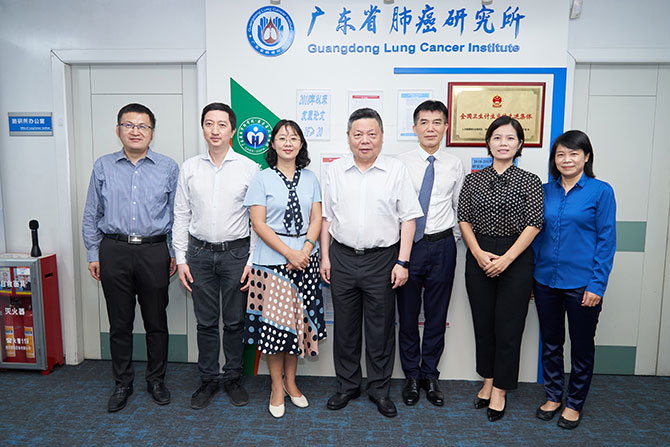

Guangming Daily, Guangzhou, August 14 (reporters: Wang Zhongyao, Wu Chunyan) At the midnight of August 12 (Beijing time), Cell · Cancer (an internationally renowned academic journal) published the latest research achievements of the team led by Wu Yilong, Honorary Director of Guangdong Lung Cancer Institute. The research introduced a new combination therapy method for first-line treatment of patients with advanced NSCLC with EGFR mutation in China. This method can extends the progression-free survival of patients to 17.9 months, which means that the risk of disease progression is reduced by 45%.
It is learnt that non-small cell lung cancer (NSCLC) accounts for roughly 85% of all lung cancer cases, and is typically detected at an advanced stage. Conventional chemotherapy is the standard therapy for advanced NSCLC, but the 5-year survival rate thereof is low. EGFR (epidermal growth factor receptor) gene mutations are typically identified in 35-50% of NSCLC patients in Asia, and the most common EGFR mutations are exon 19 deletion (Del19) and exon 21 L858R point mutation. Compared with the standard chemotherapy, the oral administration of erlotinib (an antineoplastic agent) has better efficacy and fewer side effects when being adopted to treat EGFR-mutated NSCLC patients, but often fails due to acquired drug resistance.

In 2015, the team led by Wu Yilong (initiator) joined hands with 14 relevant centers in China in conducting a Phase III study on the first-line therapy for advanced NSCLC patients with EGFR mutation, during which they compared the efficacy and safety of the bevacizumab-erlotinib combination and erlotinib alone, and explored the acquired drug resistance thereof. The research team believed that, Bevacizumab was a recombinant humanized monoclonal antibody to immunoglobulin G1 (IgG1) against vascular endothelial growth factor, which can inhibit the formation of tumor angiogenesis and ultimately achieve the purpose of “starving” tumor to death. The erlotinib-bevacizumab combination therapy may prolong the progression-free survival of NSCLC patients with EGFR mutation.
It was found in this study that, as of January 18, 2019, the progression-free survival of patients adopting the bevacizumab-erlotinib combination therapy had reached 17.9 months, much longer than that of patients adopting the erlotinib monotherapy (11.2 months), representing a 45% reduction in the risk of disease progression. And it was also find that, the toxicity of the combination therapy was manageable and tolerable without any new safety signal.
This study proved the clinical benefits and manageable safety risks of the bevacizumab-erlotinib combination therapy in treating advanced NSCLC patients with EGFR-sensitive mutation in China. Therefore, the bevacizumab-erlotinib combination therapy is suitable for the first-line treatment of advanced, metastatic or relapsed NSCLC patients with positive EGFR mutation.
Zhou Qing, Deputy Director of Guangdong Lung Cancer Institute, said that the bevacizumab-erlotinib combination therapy can not only significantly extend the progression-free survival of the target population as a whole, but even tend to extend the overall survival of patients with brain metastases.
Wu Yilong said that he would pay continuous efforts to the exploration of new targets, R&D of new drugs, establishment of new models, and tackling of difficult and hot issues regarding lung cancer, a serious life-threatening illness, by focusing on the precise and immune treatment of lung cancer guided by biomarkers, in a hope of turning lung cancer into a chronic disease.